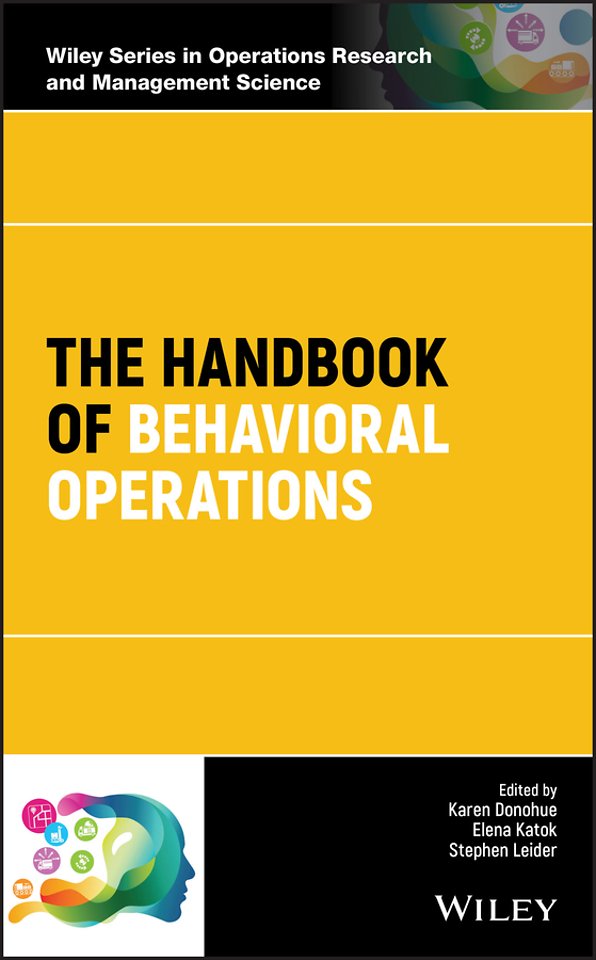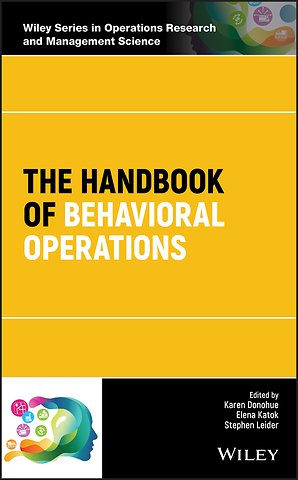The Handbook of Behavioral Operations
Gebonden Engels 2019 9781119138303Samenvatting
A comprehensive review of behavioral operations management that puts the focus on new and trending research in the field
The Handbook of Behavioral Operations offers a comprehensive resource that fills the gap in the behavioral operations management literature. This vital text highlights best practices in behavioral operations research and identifies the most current research directions and their applications. A volume in the Wiley Series in Operations Research and Management Science, this book contains contributions from an international panel of scholars from a wide variety of backgrounds who are conducting behavioral research.
The handbook provides succinct tutorials on common methods used to conduct behavioral research, serves as a resource for current topics in behavioral operations research, and as a guide to the use of new research methods. The authors review the fundamental theories and offer frameworks from a psychological, systems dynamics, and behavioral economic standpoint. They provide a crucial grounding for behavioral operations as well as an entry point for new areas of behavioral research. The handbook also presents a variety of behavioral operations applications that focus on specific areas of study and includes a survey of current and future research needs. This important resource:
Contains a summary of the methodological foundations and in–depth treatment of research best practices in behavioral research.
Provides a comprehensive review of the research conducted over the past two decades in behavioral operations, including such classic topics as inventory management, supply chain contracting, forecasting, and competitive sourcing.
Covers a wide–range of current topics and applications including supply chain risk, responsible and sustainable supply chain, health care operations, culture and trust.
Connects existing bodies of behavioral operations literature with related fields, including psychology and economics.
Provides a vision for future behavioral research in operations.
Written for academicians within the operations management community as well as for behavioral researchers, The Handbook of Behavioral Operations offers a comprehensive resource for the study of how individuals make decisions in an operational context with contributions from experts in the field.
Specificaties
Lezersrecensies
Inhoudsopgave
<p>List of contributors<br /> </p>
<p>Preface<br /> </p>
<p>Part I: Methodology<br /> </p>
<p>Chapter 1: Designing and Conducting Laboratory Experiments<br /> Elena Katok<br /> </p>
<p>1.1 Why Use Laboratory Experiments?<br /> </p>
<p>1.2 Categories of Experiments<br /> </p>
<p>1.3 Some Prototypical Games<br /> </p>
<p>1.4 Established Good Practices for Conducting BOM Laboratory<br /> </p>
<p>1.5 Infrastructure and Logistics<br /> </p>
<p>References<br /> </p>
<p>Chapter 2: Econometrics for Experiments<br /> Kyle Hyndman and Matthew Embrey<br /> </p>
<p>2.1 Introduction<br /> </p>
<p>2.2 The Interaction between Experimental Design and Econometrics<br /> </p>
<p>2.3 Testing Theory and Other Hypotheses: Classical Hypothesis Testing <br /> </p>
<p>2.4 Testing Theory and Other Hypotheses: Regression Analysis <br /> </p>
<p>2.5 Dependence of Observations <br /> </p>
<p>2.6 Subject Heterogeneity <br /> </p>
<p>2.7 Structural Estimation<br /> </p>
<p>2.8 Concluding Remarks <br /> </p>
<p>References<br /> </p>
<p>Chapter 3: Incorporating Behavioral Factors into Operations Theory<br /> Tony Haitao Cui and Yaozhong Wu<br /> </p>
<p>3.1 Types of Behavioral Models <br /> </p>
<p>3.2 Identifying Which Behavioral Factors to Include <br /> </p>
<p>3.3 Nesting the Standard Model <br /> </p>
<p>3.4 Developing Behavioral Operations Model <br /> </p>
<p>3.5 Modeling for Testable Predictions <br /> </p>
<p>References<br /> </p>
<p>Chapter 4: Behavioral Empirics and Field Experiments<br /> Maria R. Ibanez and Bradley R. Staats<br /> </p>
<p>4.1 Going to the Field to Study Behavioral Operations </p>
<p>4.2 Analyzing the Data: Common Empirical Methods </p>
<p>4.3 Field Experiments (Creating the Data) </p>
<p>4.4 Conclusion: The Way Forward </p>
<p>References </p>
<p>Part II: Classical Approaches to Analyzing Behavior<br /> </p>
<p>Chapter 5: Biases in Individual Decision Making <br /> Andrew M. Davis<br /> </p>
<p>5.1 Introduction </p>
<p>5.2 Judgments Regarding Risk </p>
<p>5.3 Evaluations of Outcomes </p>
<p>5.4 Bounded Rationality </p>
<p>5.5 Final Comments and Future Directions </p>
<p>Acknowledgments </p>
<p>Bibliography </p>
<p>Chapter 6: Other Regarding Behavior: Fairness, Reciprocity and Trust <br /> Gary E. Bolton and Yefen Chen<br /> </p>
<p>6.1 Introduction </p>
<p>6.2 The Nature of Social Preferences </p>
<p>6.3 Models of Social Preferences </p>
<p>6.4 Fair Choice: Stability and Factors that Influence It </p>
<p>6.5 Reciprocal Choice </p>
<p>6.6 Trust and Trustworthiness </p>
<p>6.7 Summary: The Empirical Nature of Fair Choice </p>
<p>References </p>
<p>Chapter 7: Behavioral Analysis of Strategic Interactions: Game Theory, Bargaining and Agency <br /> Stephen Leider<br /> </p>
<p>7.1 Behavioral Game Theory </p>
<p>7.2 Behavioral Analysis of Principal–Agent Problems </p>
<p>7.3 Bargaining </p>
<p>References </p>
<p>Chapter 8: Integration of Behavioral and Operational Elements through System Dynamics <br /> J. Bradley Morrison and Rogelio Oliva<br /> </p>
<p>8.1 Introduction </p>
<p>8.2 Decision Making in a Dynamic Environment </p>
<p>8.3 Principles (Guidelines) for Modeling Decision–making </p>
<p>8.4 Grounded Development of Decision–making Processes </p>
<p>8.5 Formulation Development and Calibration Example </p>
<p>8.6 Conclusion </p>
<p>Bibliography </p>
<p>Part III: Applications within Operations Management<br /> </p>
<p>Chapter 9: Behavioral Foundations of Queueing Systems<br /> Gad Allon and Mirko Kremer<br /> </p>
<p>9.1 Introduction and Framework </p>
<p>9.2 The Customer </p>
<p>9.3 The Server </p>
<p>9.4 The Manager </p>
<p>9.5 Testing Queueing Theory in the Laboratory </p>
<p>9.6 Conclusions and Future Research Opportunities </p>
<p>References </p>
<p>Chapter 10: New Product Development and Project Management Decisions<br /> Yael Grushka–Cockayne, Sanjiv Erat, and Joel Wooten<br /> </p>
<p>10.1 Exploration: The Creative Process </p>
<p>10.2 Plan: From Creative to Reality </p>
<p>10.3 Execute: From Planning to Execution </p>
<p>10.4 Conclusions </p>
<p>References </p>
<p>Chapter 11: Behavioral Inventory Decisions: The Newsvendor and Other Inventory Settings<br /> Michael Becker–Peth and Ulrich W. Thonemann<br /> </p>
<p>11.1 Introduction </p>
<p>11.2 Nominal and Actual Order Quantities </p>
<p>11.3 Decision Biases </p>
<p>11.4 Utility Functions </p>
<p>11.5 Individual Heterogeneity </p>
<p>11.6 Other Inventory Models </p>
<p>11.7 Summary and Outlook </p>
<p>Acknowledgments </p>
<p>References </p>
<p>Chapter 12: Forecast Decisions<br /> Paul Goodwin, Brent Moritz, and Enno Siemsen<br /> </p>
<p>12.1 An Introduction to Forecasting Behavior </p>
<p>12.2 Judgment Biases in Point Forecasting </p>
<p>12.3 Judgment Biases in Forecasting Uncertainty </p>
<p>12.4 Organizational Forecasting Processes </p>
<p>12.5 Improving Judgmental Forecasting </p>
<p>12.6 Conclusion and Future Research Opportunities </p>
<p>References </p>
<p>Chapter 13: Buyer–Supplier Interactions<br /> Kay–Yut Chen and Diana Wu<br /> </p>
<p>13.1 Introduction </p>
<p>13.2 Coordination with Imperfect Information: the Beer Distribution Game </p>
<p>13.3 Relationships under Incentive Conflicts: Contracting in Supply Chains </p>
<p>13.4 Contracting and Mechanism Design </p>
<p>13.5 Conclusion and Future Possibilities </p>
<p>References </p>
<p>Chapter 14: Trust and Trustworthiness<br /> Özalp Özer and Yanchong Zheng<br /> </p>
<p>14.1 Are There Any Business Case Studies Where Trust and Trustworthiness Matter? </p>
<p>14.2 What Is Trust? </p>
<p>14.3 What Is Trustworthiness? </p>
<p>14.4 How Can We Measure Trust and Trustworthiness? </p>
<p>14.5 What Are the Building Blocks of Trust and Trustworthiness? </p>
<p>14.6 Two Remarks on Research Methods (Optional) </p>
<p>14.7 Conclusion </p>
<p>References </p>
<p>Chapter 15: Behavioral Research in Competitive Bidding and Auction Design<br /> Wedad Elmaghraby and Elena Katok<br /> </p>
<p>15.1 Overview of Behavioral Operations Research on Auctions </p>
<p>15.2 What we learned from experimental economics literature on forward auctions </p>
<p>15.3 Buyer–Determined Auctions </p>
<p>15.4 Relationships and Moral Hazard in Auctions </p>
<p>15.5 Empirical Findings on Bidder Behavior, Judgment and Decision Making Bias </p>
<p>15.6 Supply Risk </p>
<p>15.7 Elements of Auction Design </p>
<p>15.8 Comparing and Combining Auctions with Negotiations </p>
<p>15.9 Ongoing and Future Directions </p>
<p>References </p>
<p>Chapter 16: Strategic Interactions in Transportation Networks<br /> Amnon Rapoport and Vincent Mak<br /> </p>
<p>16.1 Introduction </p>
<p>16.2 Experiments on Route Choice in Networks with Fixed Architecture </p>
<p>16.3 Experiments on Traffic Paradoxes </p>
<p>16.4 Experiments on the Pigou–Knight–Downs Paradox </p>
<p>16.5 Experiments on the Downs–Thomson Paradox </p>
<p>16.6 Experiments on the Braess Paradox </p>
<p>16.7 Discussion and Conclusions </p>
<p>References </p>
<p>Chapter 17: Incorporating Customer Behavior into Operational Decisions<br /> Anton Ovchinnikov<br /> </p>
<p>17.1 How to Think about Behaviors in Operational Settings: Customer Journey Maps </p>
<p>17.2 The Before Behaviors </p>
<p>17.3 The During Behaviors </p>
<p>17.4 The After Behaviors </p>
<p>17.5 Concluding Remarks </p>
<p>References </p>
<p>Chapter 18: The Future is Bright: Recent Trends and Emerging Topics in Behavioral Operations<br /> Karen Donohue and Kenneth Schultz<br /> </p>
<p>18.1 Introduction </p>
<p>18.2 Current Research Trends </p>
<p>18.3 Emerging Behavioral Operations Topics </p>
<p>18.4 Final Remarks </p>
<p>Acknowledgement </p>
<p>References </p>
<p>Index</p>
Rubrieken
- advisering
- algemeen management
- coaching en trainen
- communicatie en media
- economie
- financieel management
- inkoop en logistiek
- internet en social media
- it-management / ict
- juridisch
- leiderschap
- marketing
- mens en maatschappij
- non-profit
- ondernemen
- organisatiekunde
- personal finance
- personeelsmanagement
- persoonlijke effectiviteit
- projectmanagement
- psychologie
- reclame en verkoop
- strategisch management
- verandermanagement
- werk en loopbaan

